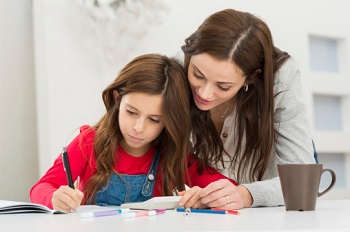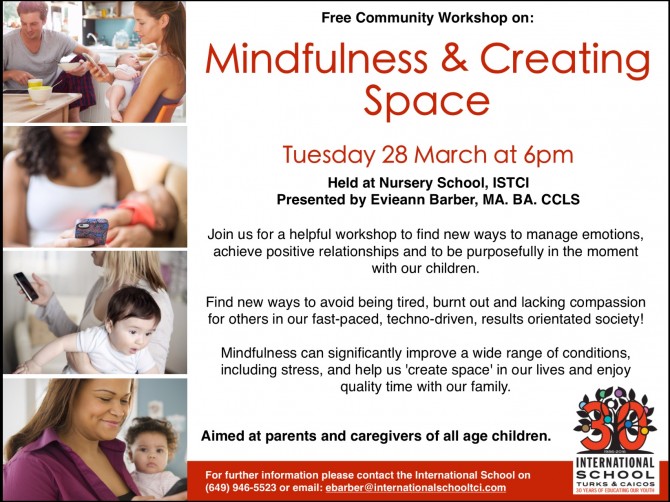Blog
ISTCI Nursery School Workshop – Mindfulness & Creating Space, 28 March
- March 15, 2017
- Category: Extra Curricular Activities (Clubs), Grade 1, Grade 2, Grade 3, Grade 4, Grade 5, Grade 6, Junior Kindergarten, Nursery, Preschool, PTA, Senior Kindergarten

ISTCI Nursery School Workshop- Mindfulness & Creating Space
Tuesday 28 March at 6pm Held at Nursery School, ISTCI Presented by Evieann Barber, BA. MA. CCLS
How do we find 'Mindfulness in our fast-paced, techno-driven and results-orientated society? Mindfulness has arrived, or at least the word 'mindfulness' is everywhere, so what is it? and can it help improve our parenting skills? Free workshop, aimed at parents and caregivers of all age children.
Join us for a helpful workshop to find new ways to manage emotions, achieve positive relationships and to be purposefully in the moment with our children.
Find new ways to avoid being tired, burnt out and lacking compassion for others in our fast-paced, techno-driven, results orientated society!
Mindfulness can significantly improve a wide range of conditions, including stress, and help us 'create space' in our lives and enjoy quality time with our family.
Free workshop, aimed at parents and caregivers of all age children.
Join us for a helpful workshop to find new ways to manage emotions, achieve positive relationships and to be purposefully in the moment with our children.
Find new ways to avoid being tired, burnt out and lacking compassion for others in our fast-paced, techno-driven, results orientated society!
Mindfulness can significantly improve a wide range of conditions, including stress, and help us 'create space' in our lives and enjoy quality time with our family.

Contact us about the ISTCI Nursery School Workshop:
For further information please contact the International School on (649) 946-5523 or email: ebarber@internationalschooltci.com
Upcoming Workshops
We also have another free workshop coming up on 'How do we foster great parent-child interactions & healthy attachments?'
Join us on Tuesday 21 February at 6pm Held at Nursery School, ISTCI. Presented by Evieann Barber, BA. MA. CCLS
Our Community Newsletter:
Welcome to ‘Invest Time in a Child’s Mind’, a free and informative and educational paper for parents and early years educators. We aim to provide research-driven, school success tips with easy reach of parents.- Issue 3 of the Nursery Newsletter ‘Invest Time in a Child’s Mind’ - January 2017
- Issue 3 of the Nursery Newsletter ‘Invest Time in a Child’s Mind’ - September 2016
- Issue 2 of the Nursery Newsletter ‘Invest Time in a Child’s Mind’ - April 2016
- Issue 1 of the Nursery Newsletter ‘Invest Time in a Child’s Mind’ - January 2016
2017 – Find ‘Mindfulness’ in our fast-paced, techno-driven, results-oriented society!
By School Psychologist Mary Spence PhD Issue 4, January 2017 Mindfulness has arrived, or at least the word “mindfulness” is everywhere in the culture at large. So, what is mindfulness? The definition of mindfulness provided by its founder, Jon Kabat-Zinn, includes three essential components: 1) Paying attention in the present moment 2) On purpose 3) Without judgment I want mindfulness to survive its popularity because I believe that the practice of being mindful can remind us of who we really are, bring us back to our common humanity, and invite us to remain integrated in mind and body.Even though I doubt we will see mindfulness practices adopted universally in schools or other governmental organizations, I am hopeful that the work will continue to grow and be valued, particularly as one of the essential skill-sets for the development of social emotional learning (SEL).“HOW DID THINGS GET SO CRAZY IN THE FIRST PLACE — HOW DID REFLECTION GET THE SHORT SHRIFT IN OUR LIVES?
Social and emotional learning (SEL) involves understanding and managing emotions, setting and achieving positive goals, feeling and showing empathy for others, establishing and maintaining positive relationships, and making responsible decisions, according to CASEL, the Collaborative for Academic, Social, and Emotional Learning. I think the widespread interest in mindfulness practices can remind us all that we need to “create space” in our lives through reflection and creative pursuits something I believe to be sorely lacking in our fast-paced, techno-driven, results oriented society.“WHAT WE DO TO OUR CHILDREN, THEY WILL DO TO SOCIETY.” Dr. Karl Menninger
My view is that mindfulness is a broader term than meditation. Mindfulness refers to one’s ability to live life from a less ego-driven, fear-based place. Usually this is best accomplished from a deep understanding of the nature of the mind and practices that allow you to regularly make contact with, and sustain connection to, the spaciousness of your inner awareness. Meditation is typically the vehicle by which this most readily occurs and I’m a staunch advocate of developing a meditation practice for individual well-being. Nowadays, learning to meditate is recognized as a standalone practice and recommended by many, including WebMD, the Mayo Clinic, and other medical/mental health pundits. Extensive studies are documenting the benefits of regular meditation practice on the brain’s health and wellbeing. However, I don’t believe that it is essential to developing a mindful presence in your life. For me, mindfulness is being contemplative and compassionate, to yourself as well as others; letting go of ego; and recognizing our common humanity. Both meditation and mindfulness involve becoming silent and still for periods of time to allow for an inner focus. Because mindfulness uses moment-to-moment awareness, it has parallels to essential elements of play. This makes it perfect to teach young children, who often don’t live in their heads as much as we do once we’ve been socialized to sit still, think, and produce. Ironically, by honoring this important connection between mind and body, the end goal we desire is much more likely to authentically take hold, so that teachers can more readily teach good curriculum without having to wade through all the classroom management issues. There are a number of great children’s books worth exploring on mindfulness. Some of my favorite recent titles include: Dan Siegel’s Brainstorm: The Power and Purpose of the Teenage Brain, Kristin Neff’s Self-Compassion books, Trish Broderick’s Learning to Breathe: A Mindfulness Curriculum for Adolescents to Cultivate Emotion Regulation, Attention, and Performance, and Daniel Rechtschaffen’s The Way of Mindful Education: Cultivating Well-Being in Teachers and Students.“MINDFULNESS REFERS TO ONE’S ABILITY TO LIVE LIFE FROM A LESS EGO-DRIVEN, FEAR-BASED PLACE.”

